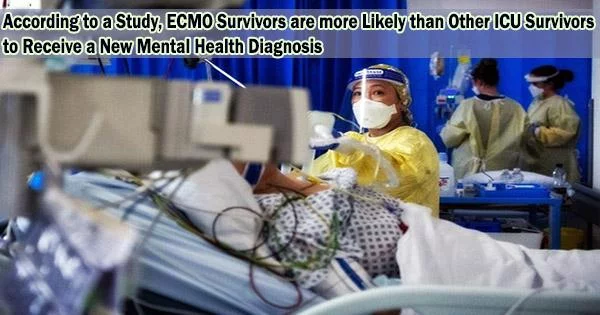According to the first study of its kind, which was published in JAMA, survivors of ECMO life support had a 24% higher prevalence of new mental health diagnoses following discharge compared to other ICU survivors.
The most sophisticated type of life support is extracorporeal membrane oxygenation, or ECMO. Patients with heart or respiratory failure have their hearts and lungs temporarily replaced. Patients who are younger, healthier, and most likely to survive are typically the only ones who receive this expensive treatment. This is the first study to examine the impact on their mental health.
“ECMO saves lives. About 50 to 65% of patients who receive this treatment will survive, and most are alive five years later,” said Dr. Shannon Fernando, a critical care physician at Lakeridge Health and postdoctoral fellow at The Ottawa Hospital and the University of Ottawa.
“We already knew that ICU survivors can suffer mental health impacts from the trauma of invasive treatments, living with new physical limitations and dealing with long recovery times. We suspected ECMO survivors would be at greater risk of mental health impacts because they are sedated and ventilated for longer and often face a more challenging recovery. But we didn’t have clear data until now.”
To find out, the team of researchers from The Ottawa Hospital, the Institut du Savoir Montfort, ICES and the University of Ottawa looked at health records from all ICU survivors in Ontario, Canada from April 2010 to March 2020.
The 642 ECMO survivors were matched with 3,820 other ICU survivors who shared similar traits, such as age, sex, mental health history, critical disease severity, and length of hospital stay. In comparison to other ICU survivors, ECMO patients had a 24% greater prevalence of new mental health diagnoses, according to one investigation.
As care providers, we can tell our patients that it’s common to struggle with your mental health after an ICU admission. ICU survivors need to realize that they often face months or years of recovery, and families and healthcare providers need to support them.
Dr. Peter Tanuseputro
236 (37%) of the 642 ECMO survivors had a new mental health diagnosis. Depression, anxiety, and traumatic disorders, which are mental health illnesses brought on by a traumatic experience, were the most often diagnosed conditions. These are the most prevalent mental health conditions among people who have survived serious illnesses, according to earlier research.
“As care providers, we can tell our patients that it’s common to struggle with your mental health after an ICU admission,” said Dr. Peter Tanuseputro, co-senior author, physician-scientist at The Ottawa Hospital and ICES, investigator at the Bruyère Research Institute and associate professor at the Department of Medicine, University of Ottawa. “ICU survivors need to realize that they often face months or years of recovery, and families and healthcare providers need to support them.”
The findings of this study are especially pertinent during the COVID-19 pandemic, when the use of ECMO increased globally to treat previously unheard-of numbers of patients with acute respiratory failure. At the height of the pandemic, the province of Ontario had twice as many patients on ECMO as it did pre-pandemic.
“We suddenly have a lot more ECMO survivors because of COVID-19. We need to make sure they have the mental health support they need to recover and thrive.” said Dr. Kwadwo Kyeremanteng, co-senior author on the paper and scientist and critical care physician at The Ottawa Hospital, senior clinician investigator at the Institut du Savoir Montfort and assistant professor at the University of Ottawa.
The Montfort Alternate Funding Plan has awarded the research team a grant to evaluate a virtual therapy program for post-ICU syndrome, a combination of symptoms that continue after an ICU admission.
To centralize services and relieve the burden on primary care doctors and emergency rooms, the initiative will provide physical therapy, dietary counseling, and mental health services.
The exact reasons why ECMO survivors are at greater risk of mental health problems compared to other ICU survivors is still unclear, and more research is needed.
“We really need more research and investment in the area of post-critical illness,” said Dr. Fernando. “Patients will need help long after they leave the ICU.”
















